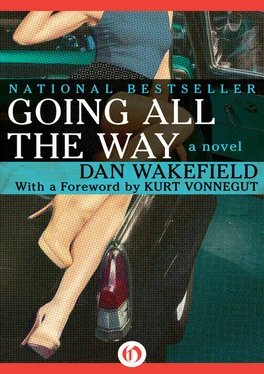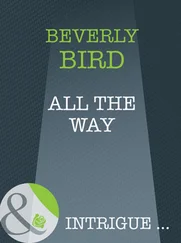“What ‘masters?’” Gunner asked.
Mr. Libby smiled benignly. “Men like Orville Lockwood. Himself. He is on our board of directors.”
“Really?” Nina said.
Lockwood was the guy who drew all the famous covers of American Life magazine that were so beloved by all. Or at least by most everyone. Secretly, Sonny got depressed by them, all those pictures of happy families with good old white-haired Grandma and overworked Pop and long-suffering Mom, and the mischievous kids, all around the Christmas tree or the Thanksgiving dinner table, the way everything was supposed to be. The worst things that ever happened in those pictures were little Spot the dog having to get a bandage on his paw or little Junior getting caught stealing from the cookie jar. The pictures always made Sonny feel that’s how things were supposed to be and the fact that his own family wasn’t like that at all made him feel worse about everything. He wished that fucking Lockwood would come and spend a Christmas at his house, with everyone sullen and on edge and disappointed, his father with a holiday migraine headache and his grandmother having hysterics because Uncle Buck had disappeared after the Christmas Eve office party, and his mother wringing her hands because she forgot to put the stuffing in the turkey. He wished the bastard would draw a picture of that .
“Orville Lockwood!” Nina said. “ The Orville Lockwood?”
“The only one,” Mr. Libby said proudly.
“Did you hear that, darling?”
“Yes, Mother,” Gunner said. He had sunk into an armchair, staring at something far away.
“The entire course can be begun with only a thirty-dollar deposit,” Mr. Libby said quietly to Nina, “the rest paid in installments after each of the twelve lessons.”
“Only thirty dollars!”
“Mother, I haven’t got it,” Gunner said.
“Well I have!” she said and fished into her purse, bringing out a checkbook.
Gunner jumped up and shouted, “No, please! I don’t want to. I don’t want to take the lessons. I’m already taking lessons.”
“I know what kind of lessons you’re taking,” Nina huffed.
“Don’t you pay. Don’t take her money!” he shouted at Libby.
Gunner had a big principle about not taking his mother’s money or letting her pay for things for him after he got out of college. He had explained the theory about it to Sonny, about how a guy had to really be independent and if you took from people you owed them something, even relatives, maybe even especially relatives, because a lot of times what they wanted in return was more than money and more than you could pay. Sonny agreed wholeheartedly and knew that was right, but didn’t mention to Gunner how he still got almost all his spending money from his mother. It was too embarrassing. He promised himself that when his real life got underway he would refuse any money that his mother offered him. He would stand on his own two feet.
Gunner ended up paying the down payment for the Artists Unlimited course and enrolling himself in the twelve-lesson plan, which came to a total of $120. Mr. Libby assured Nina that Gunner would never regret it. He didn’t even try to assure Gunner, who was fit to be tied by then.
When Mr. Libby left, Nina mixed a batch of martinis for everyone, saying they certainly had something to celebrate. The beginning of Gunner’s artistic career.
Gunner’s eyes had begun to move back in his head, and he had a sort of blank, zombie expression.
“Now that you’re having real art lessons,” Nina said, “you won’t have to spend so much time with that little Jewish girl.”
“Her name is Marty,” Gunner said wearily. “You could just call her Marty. You don’t have to put in the ‘Jewish’ all the time.”
“Oh. Does it bother you? That she’s Jewish.”
“No, Mother. It bothers you .”
“Are you trying to accuse me of being prejudiced?”
“I’m not accusing anybody of being anything.”
“I better get going on home pretty soon,” Sonny said, but no one seemed to pay any attention to him. He was mainly trying to give Gunner an excuse to get out, but Gunner seemed in some stage beyond really being bothered, like he had switched off a whole set of nerves, or injected Novocain into his mind. Maybe it was some kind of Zen trick he’d learned in Japan. The Japs seemed to know the answer to everything—fucking and turning your mind off.
“I never said a word when you took out those little Jewish girls in high school, and even in college,” Nina went on. “I’m as broadminded as the next person. But now, it’s a different story.”
“Why?” Gunner asked, out of the depths of his trance.
“For heaven sake, you’re a man now. You’ll be getting married.”
“I will?”
“Well, won’t you?”
“I don’t know.”
“Of course you will. You’re at the age when any girl is a potential wife. You know that as well as I do. Don’t play dumb.”
“I’m not.”
“Not going to marry her?”
“Not playing dumb.”
“Then you are going to marry her, is that what you’re saying? You’re telling me you’re going to marry a Jewish girl?”
“What if I am?”
“Listen to him!” Nina said frantically, looking to Sonny for consolation. “Do you hear what he’s saying?”
“Well, I’m not sure,” Sonny said, swallowing what he hoped was enough martini to get him to the place where Gunner seemed to be.
“Of course, you’re playing dumb, too.” Nina said. “I forgot, she’s a friend of yours. You introduced her to Gunner, didn’t you?”
“No, ma’am,” Sonny said.
“We all met at once,” Gunner said. “At the museum.”
“That’s beside the point! Don’t you know what it means, marrying a Jewish girl? Don’t you know what they do, before they get married?”
“What do they do?” Gunner asked with real curiosity.
Nina started sobbing. “I hope she has a handsome father. I hope that much.”
“Why?” Gunner asked. He sat forward, as if waked from his coma, still calm but now genuinely curious.
“Don’t you know?” she sobbed. “Don’t you know what they do before a daughter is married? Oh, God.”
“What do they do?” Gunner asked.
“The father, the night before the wedding. He does it with his own daughter! It’s part of the Jew religion—they make them do it!”
The tears were streaming down Nina’s cheeks and dropping into her martini, which she clutched with both hands.
“Where did you hear that, Mother?” Gunner asked quietly. “How did you happen to come by that little nugget?”
“Everyone knows,” she screamed. “It’s common knowledge!”
She rushed to the bedroom, sobbing, and slammed the door.
Gunner ran a hand over his forehead and then slugged down the last of his martini. “Well,” he said. “You learn something every day.”
“Jesus, where do you suppose she got that?” Sonny asked.
“I dunno. Sunday school, maybe. Wherever it was she learned that Catholic priests charge two hundred dollars for praying the soul of a sinner into Purgatory.”
“Two hundred?” Sonny asked.
“That was when I was a kid,” Gunner said. “It’s probably gone up, like everything else.”
Sonny was relieved to know that Gunner was still his friend, but he realized there wouldn’t be as much chance to hang around with him now, what with the sexy Jewish girl providing him with afternoons of art and evenings of lustful abandon. Or so at least Sonny imagined Gunner’s schedule—a full life if there ever was one. Sonny determined once again to fill the long, hot days of his own existence with something more than whipped-cream desserts and television, swore he would try to “pull himself together,” as his father put it. The summer was melting away like the unfinished ice cream Sonny left on his plate at breakfast, running out in a soupy mess.
Читать дальше












